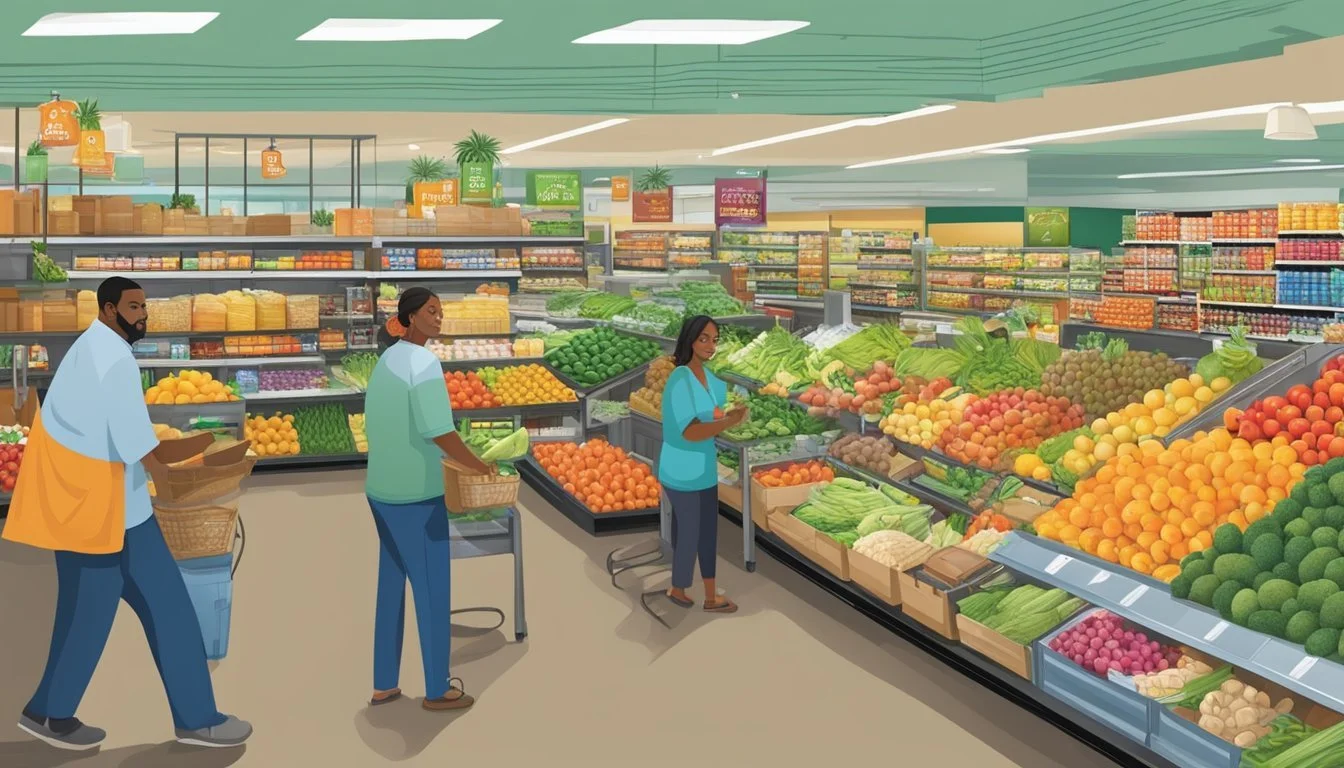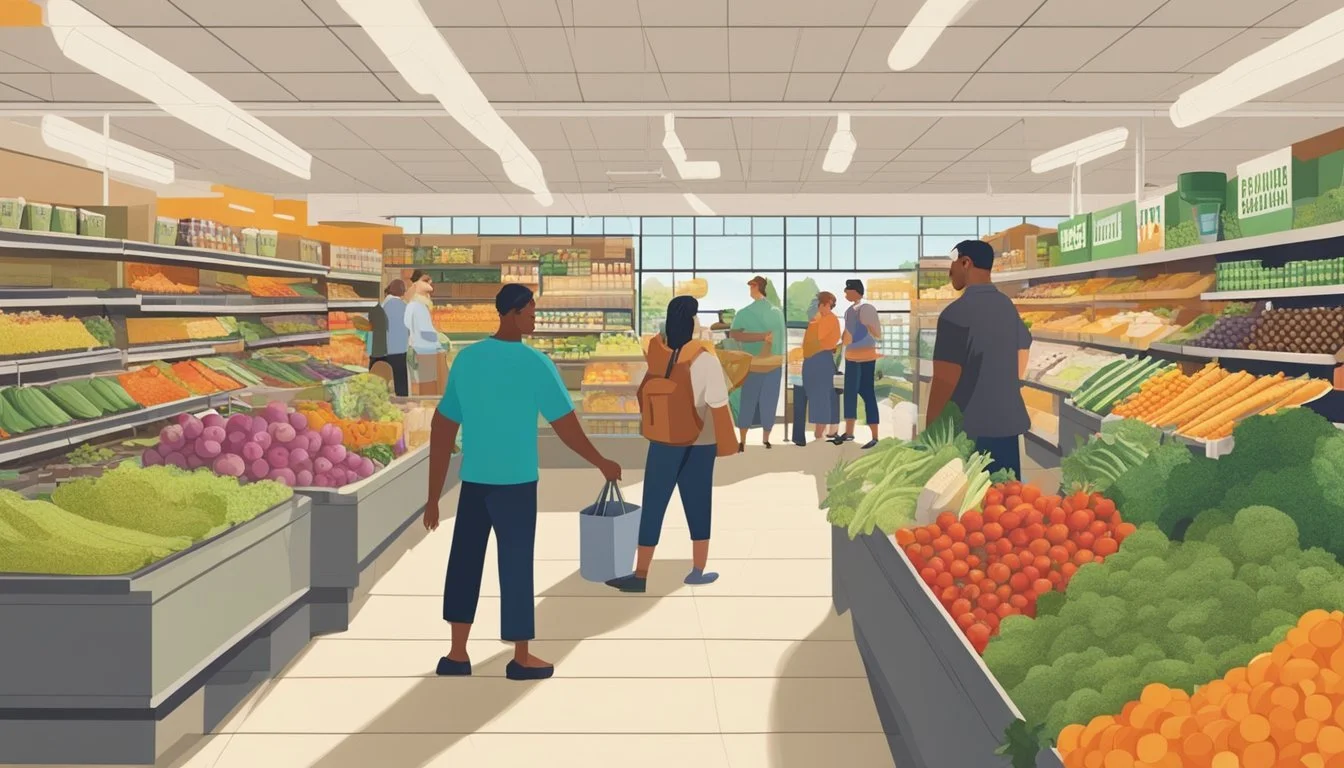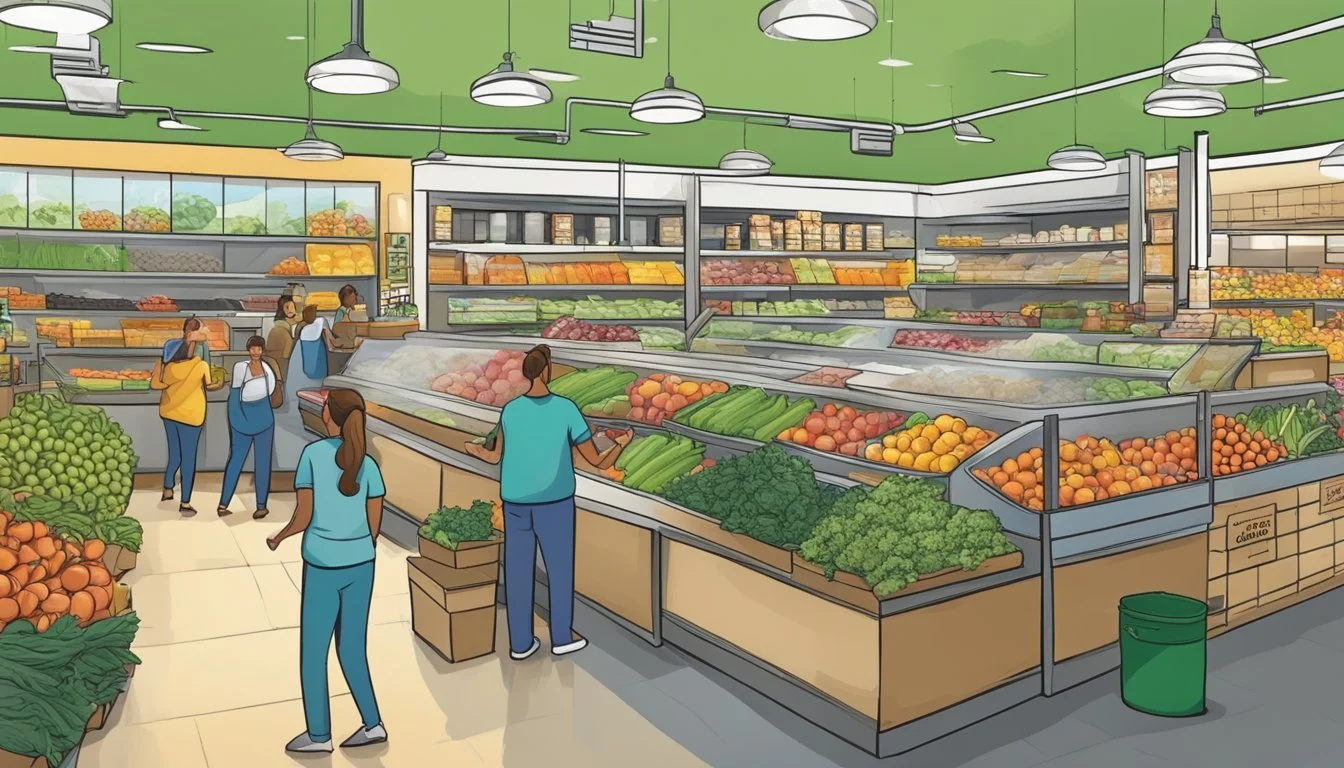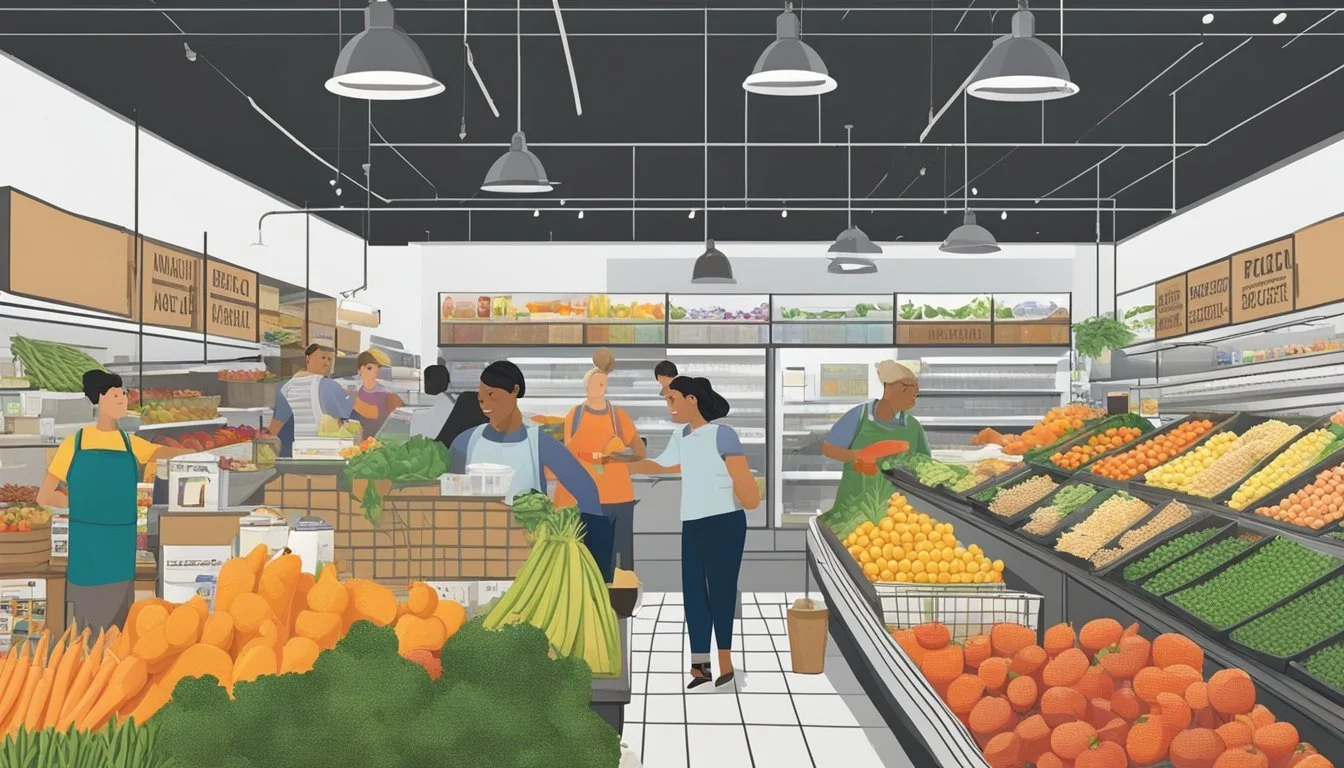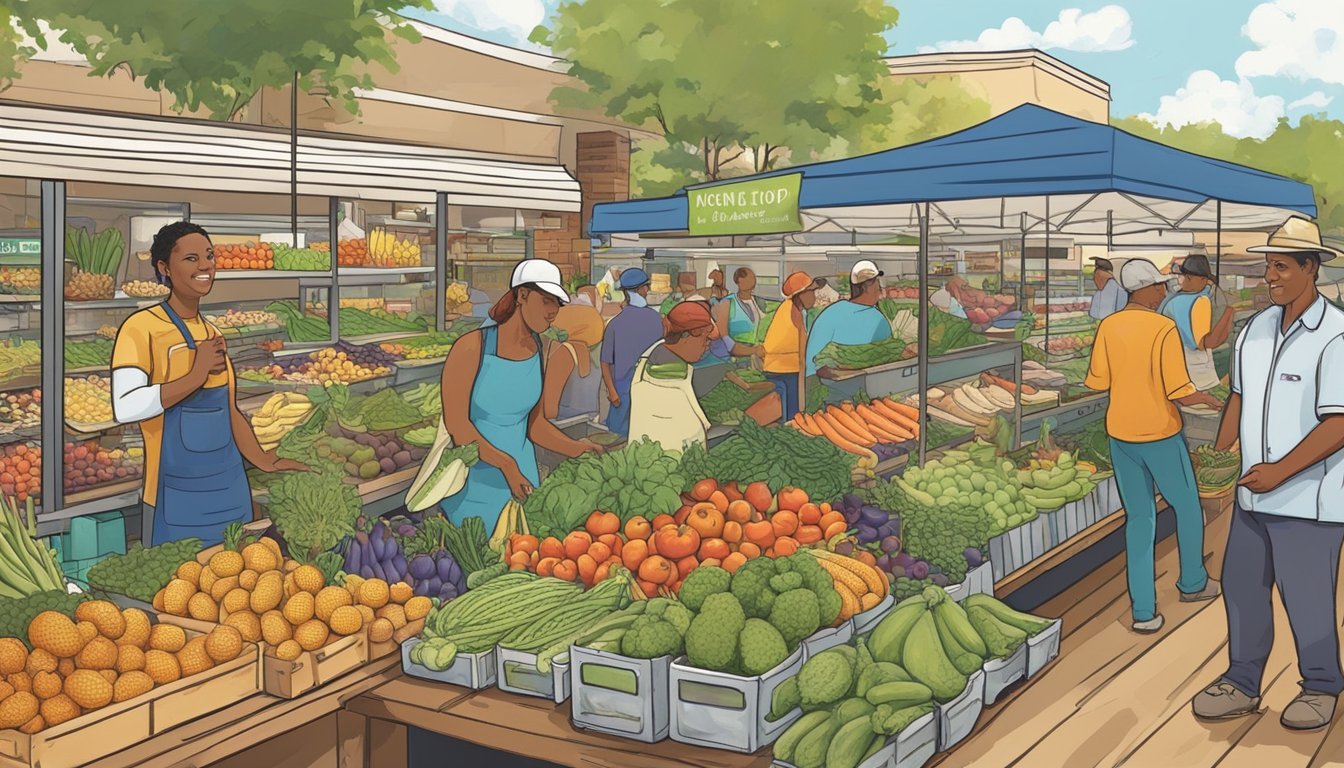Guide to Food Co-Ops in Tampa, FL
Your Local Shopping Guide
Food co-ops offer a unique approach to grocery shopping, providing communities with access to fresh, locally-sourced, and often organic produce. In Tampa, Florida, the burgeoning food co-op scene is an embodiment of this community-oriented philosophy, catering to a growing number of residents prioritizing health, sustainability, and local agriculture. These co-operatives operate on a membership basis but often welcome the general public to shop, allowing non-members to benefit from their rich variety of foods.
Tampa's mild climate and agricultural surroundings make it an ideal location for food co-ops that highlight seasonal fruits, vegetables, and other organic products. Establishments like Green Door Organics and Tampa Bay Organics exemplify this, offering selections that change weekly and underscore the region's agricultural diversity. They provide not only grocery items but also a connection to the local farming community, underscoring the importance of understanding where one's food comes from.
Navigating through Tampa's food co-ops, shoppers encounter an array of choices. From specialized markets focusing on organic produce to those that extend their offerings to include health and nutrition products, there's a co-op to suit a variety of needs and preferences. Places like Wolfe's Produce and Abby's Health & Nutrition also highlight the personal touch of family ownership and customer service, delivering a shopping experience that mixes both quality and care.
What Are Food Co-Ops?
Food Co-Ops are community-focused organizations that provide access to high-quality, often organic food products. These cooperatives operate on principles of member ownership and democratic control, differing significantly from traditional grocery stores.
History of Food Co-Ops
Food Co-Ops have a rich history dating back to the 19th century, where they began as collaborative buying clubs for farmers and consumers seeking to sidestep middlemen and foster direct relationships. Their evolution was marked by a commitment to community and mutual benefit, which remains at the heart of the cooperative movement today.
Core Principles
At their core, Food Co-Ops adhere to several key principles:
Voluntary and Open Membership: Co-Ops are open to all individuals willing to accept the responsibilities of membership.
Democratic Member Control: Operated by members who actively participate in setting policies and making decisions.
Economic Participation: Members contribute equitably to, and democratically control, the capital of their co-op.
Autonomy and Independence: Co-Ops are autonomous, self-help organizations controlled by their members.
Education, Training, and Information: Co-Ops provide education and training for their members to contribute effectively to the development of their co-ops.
Cooperation among Cooperatives: By working together, cooperatives improve services, bolster local economies, and strengthen the cooperative movement.
Concern for Community: Co-Ops work for the sustainable development of their communities through policies approved by their members.
Food Co-Op vs. Traditional Grocery Store
The main differences between a Food Co-Op and a traditional grocery store include:
Ownership: Co-Ops are owned by members (consumers or workers), while traditional stores are typically owned by individuals or shareholders.
Profit Distribution: Any profits in a Co-Op are returned to members based on use, whereas traditional stores distribute profits based on investment.
Product Selection: Co-Ops prioritize products such as organic food, locally sourced from farmers and producers, compared to conventional grocery stores which may offer a wider range of mainstream products.
Decision-Making: In Co-Ops, decisions are made based on member votes, whereas traditional grocery stores make decisions based on management or corporate directives.
Benefits of Joining a Food Co-Op
Joining a food co-op in Tampa, FL offers numerous advantages that resonate with values of sustainability, health, and community support. Members can expect to engage directly with the local food system and gain access to nutritionally rich offerings.
Supporting Local Economy
When individuals participate in a food co-op, they play a critical role in propelling the local economy. Local food co-ops are known for sourcing products from nearby farmers and producers, keeping money circulating within the community. This can lead to the nurturing of small businesses and the creation of jobs in the Tampa area.
Access to Fresh Produce
Shelves at a food co-op typically brim with fresh groceries, including a plethora of seasonal produce. Because these goods are sourced locally, they often travel a shorter distance to the store, ensuring freshness upon arrival. This direct farm-to-shelf pipeline not only bolsters freshness but also enables the co-op to provide a diverse array of produce that reflects the region's seasonal best.
Local Food: Often sourced within a close radius, ensuring minimal transit time.
Seasonal Produce: Curated selections that celebrate the peak harvest periods.
Health and Nutrition
Food co-ops prioritize offering healthy options to their members. The focus on whole foods, organic produce, and minimally processed items supports a nutritious diet. Furthermore, by providing such healthy, local food, food co-ops in Tampa empower individuals to make informed choices conducive to maintaining or improving their well-being.
Healthy Choices: Emphasis on natural and organic food selections.
Nutrition Education: Opportunities for members to learn about health benefits and nutritious eating habits.
Understanding Food Co-Ops in Tampa, FL
In Tampa, Florida, food co-ops serve as hubs for local food distribution, emphasizing community involvement and support for local producers. They operate as member-controlled entities, offering a range of organic and locally sourced products. With a focus on sustainability and education, these co-ops play a pivotal role in the region's food landscape.
Popular Tampa Co-Ops Explained
Sweetwater Organic Farm stands out as a leader within Tampa's co-op scene. Since 1995, it has not only provided organic produce to the community but also education on sustainable agriculture. Members can enjoy fresh fruits, vegetables, and pantry staples, with some co-ops like LocalHarvest offering a variety of box sizes for pickup, illustrating the region's dedication to flexible and accessible healthy food options.
Membership and Participation
Becoming a member of a Tampa co-op typically involves a small initial membership fee, followed by a minimal per-order fee. For instance, one might encounter a one-time fee of $10 and a $2.00 co-op fee with each order. Membership often empowers patrons with voting rights on co-op matters, enhancing the democratic governance that co-ops advocate. This thriving cooperative economy allows for closer connections between Tampa residents and their food sources, fostering a community-oriented market space.
Community Outreach
Tampa co-ops regularly partake in community outreach, aligning their missions with organizations such as Feeding Tampa Bay—the leading force in the battle against hunger within the 10-County Region. By partnering with local food assistance programs and hosting educational events, these co-ops contribute significantly to alleviating food insecurity and enriching the community's understanding of nutrition and sustainable practices.
How to Start Shopping at a Food Co-Op
Joining a food co-op in Tampa, FL, allows shoppers to access fresh, locally-sourced produce and groceries in a community-focused environment. It's essential to understand how to navigate the aisles, make the most of seasonal selections, and locate organic options.
Navigating the Aisles
When a shopper first enters a food co-op, they will encounter a variety of aisles much like a traditional grocery store, but with a focus on sustainable food practices. To ensure an efficient shopping experience, one should look for the co-op's floor plan, often available at the entrance or customer service desk.
Produce: Most food co-ops pride themselves on a rich assortment of locally-grown fruits and vegetables displayed at the front.
Packaged Goods: Along the center aisles, shoppers will find dry goods such as grains, pastas, and canned items with an emphasis on organic and non-GMO labels.
Dairy & Meat: Typically, these are located towards the back, with options ranging from conventional to grass-fed or plant-based alternatives.
Seasonal Selections
One of the highlights of shopping at a food co-op is the access to fresh, seasonal produce that supports local farmers and reduces carbon footprint.
Spring: Look out for tender greens and sweet berries.
Summer: Expect an abundance of juicy tomatoes and fresh corn.
Fall: Shoppers will find a variety of squashes and root vegetables.
Winter: Citrus fruits and hearty greens are commonly available.
By paying attention to the seasonal availability charts, often posted in the produce section, shoppers can enjoy fruits and vegetables at the peak of their flavor and nutrition.
Finding Organic Options
Organic stores within the co-op environment often provide clear signage and labels to help shoppers identify organic options.
Labels: Certified organic products will have a USDA Organic seal.
Shelving: Some co-ops have dedicated sections for organic products, while others integrate them with non-organic items but with distinct labeling.
Shoppers seeking organic groceries can always ask staff members for assistance, as they are typically well-informed about the sourcing and practices of the products on the shelves.
Local Farmers and Suppliers
Tampa, FL, offers a rich tapestry of local farmers and suppliers, featuring a vast selection of organic and locally-sourced products. These entities contribute significantly to the area’s food culture by providing fresh, quality produce and meats.
Meet Tampa's Growers
In the Tampa area, LocalHarvest keeps a comprehensive directory of family farms and markets where consumers can find organic food. For instance, farms in Central Florida apply sustainable methods to grow a variety of fruits and vegetables. Consumers have the opportunity to connect directly with these growers, ensuring they receive the freshest possible produce while supporting the local economy.
Brandon, FL: Farms here may offer community-supported agriculture (CSA) shares, fostering a closer bond between growers and the community.
Clearwater: Known for its natural foods co-op, which is hailed for its range of natural and organic foods.
Ranchers and Organic Providers
Ranchers in the region take pride in their commitment to organic practices. Organic meat, eggs, and dairy products from local ranchers meet strict standards and often come from free-ranging animals that are raised without the use of hormones or antibiotics.
Central Florida Ranchers: Offer local meat from their farms, which can be found through LocalHarvest’s network.
Organic Feed Programs: Developed over years to achieve superb taste and nutritional value, with some even OMRI-certified, enhancing the quality of produce and livestock alike.
By highlighting Tampa's growers and ranchers, this section brings into focus the diverse and thriving community of organic providers in the Tampa region.
Food Co-Op Community Events
Food Co-Ops in Tampa, FL, actively foster community engagement through educational and social events centered around food. These gatherings are designed to promote sustainable living, healthy eating habits, and cooperative business principles.
Workshops and Cooking Classes
Members and non-members alike have the opportunity to join workshops and cooking classes organized by food co-ops. These workshops often focus on teaching participants how to prepare nutritious meals using organic and local produce. For example, the Tampa Bay Organics co-op may offer classes on how to incorporate seasonal vegetables into one's diet, reflecting their commitment to providing fresh, Certified Organic food.
Workshop Examples:
Seasonal Cooking Techniques
Organic Food Preparation
Sustainable Eating Habits
Annual Meetings and Gatherings
Food co-ops typically hold annual meetings where members can partake in decision-making and policy discussions, emphasizing the collaborative nature of a co-op. These meetings often coincide with gatherings that celebrate the community, such as the Tampa Bay Collard Greens Fest, which can serve as a platform for members to interact, share experiences, and discuss the co-op's impact on local food pantries and partnership with food pantry partners.
Annual Gatherings Include:
Member Decision-making Sessions
Community Celebrations like the Tampa Bay Chocolate Festival
Information Sessions on the Role of Co-ops in Supporting Food Pantries
Cooperative events not only encourage community participation but also enhance the collective understanding of food sourcing and preparation. They serve as an integral part of the Tampa food co-op experience, strengthening the bonds between members and the local community.
Contribution to Sustainability
Food co-ops in Tampa, FL, have a critical role in fostering a sustainable food system that prioritizes environmental health and resource conservation.
Environmental Impact
Food co-ops often support local producers, reducing the need for long-haul transportation and associated emissions. They usually have a strong commitment to organic agriculture, which minimizes the use of synthetic pesticides and fertilizers, benefiting the local ecosystem. Greenhearts Family Farm exemplifies this ethos, focusing on sustainable farming methods that contribute to a healthier planet.
Sustainable Practices in Food Distribution
The implementation of sustainable practices in food distribution is notable in Tampa's food co-ops. They typically utilize:
Energy-efficient storage and refrigeration
Reduced packaging, often involving biodegradable or recyclable materials
Collaboration with regional food networks to optimize supply chains and limit waste
By aligning with organizations like Feeding America, co-ops maximize resource use and support community-wide stability through responsible food distribution.
Future of Food Co-Ops
Food Co-operatives in Tampa, FL are positioned for meaningful growth and technological advancement in response to community needs and industry trends.
Growth Trends
Surveys and market analyses predict an uptick in food co-op initiatives, driven by consumer demand for local, sustainable, and ethically sourced products. Tampa’s food co-ops have seen a steady increase in both membership and consumer base, indicating a robust trend towards community-supported agriculture and cooperative business models. Access to fresh, organic produce through co-ops like Sweetwater Organic Farm showcases the potential for expansion in both urban and suburban settings within the region.
Membership Growth: Steady rise in co-op memberships, indicating heightened consumer interest.
Economic Impact: Positive effects on local economies through job creation and local capital circulation.
Community Engagement: Increased community involvement and support for co-ops.
Technological Innovations
Co-ops are beginning to leverage technology to enhance operational efficiency and improve access to their products. Tampa’s food co-ops are adopting online platforms for order placement and member communication, as well as investing in data management systems to track inventory and sales trends.
E-commerce Platforms: Adoption of online marketplaces for consumer convenience and expanded reach.
Inventory Management: Implementation of sophisticated inventory systems for better product tracking and waste reduction.
Consumer Apps: Development of mobile applications to provide members with real-time updates, offers, and community events.
Additional Resources
In the realm of food co-ops and broader community food resources in Tampa, FL, individuals have access to a range of educational materials and networks that enhance the local food system's resilience and accessibility. The following subsections provide insights into resources available for education and partnerships.
Educational Materials and Research
The Women, Infants, and Children (WIC) Program serves as a fundamental resource for families in need of nutritional support. WIC offers educational materials focusing on nutrition education and counseling, along with breastfeeding support. These resources are critical for empowering recipients with knowledge to make healthier choices.
For those interested in broader research related to food systems, food co-ops often host libraries or online portals filled with literature on sustainable practices, organic farming, and economic studies on local food impact.
Local Partners and Networks
Partnerships with local entities significantly strengthen the effectiveness of food co-ops. Grocery Distributions like Green Door Organics provide fresh, certified organic food to co-op members, illustrating a direct link between local farms and the community.
Networks with culturally specific organizations such as the Asian American Food Company enhance the diversity of products offered at food co-ops, ensuring a wide range of culturally relevant and nutritious options for all community members.
Through initiatives like Local Foodz Cali, Tampa residents can connect to a network that delivers locally-sourced, prepared meals, further supporting the local economy and making healthy food more accessible to busy individuals and families.
By combining educational outreach with a strong network of local partnerships, Tampa's food co-ops function as essential components of a sustainable and inclusive food system.
Conclusion
The Tampa Bay area offers an array of food co-ops that serve as a testament to the community's dedication to organic, local, and sustainable food practices. These establishments have garnered positive reviews for their fresh produce and commitment to customer service. They range from family-owned farms, like Green Door Organics, to more extensive networks such as Tampa Bay Organics. Each co-op provides a unique selection of products, potentially resulting in cost savings for those who prioritize organic and natural foods.
For residents and visitors alike, these co-ops are more than just grocery stops; they are integral parts of a community striving for healthier living and stronger local economies. These institutions uphold the dual goals of offering quality products and fostering community engagement through ethical food practices.
While adhering to organic standards, they also facilitate relationships between consumers and growers. This supports the regional economy and provides transparency about the sourcing of one's food. It’s clear that Tampa's food co-ops are a vibrant and essential feature of the local food landscape, delivering both health and economic benefits to the community.
In exploring these co-ops, individuals should expect variety and seasonal selections, reflective of the sustainable practices that many of these cooperatives espouse. For those seeking to integrate into the community or simply to enjoy fresh, locally-sourced food, Tampa’s co-ops offer a reliable and commendable option.

